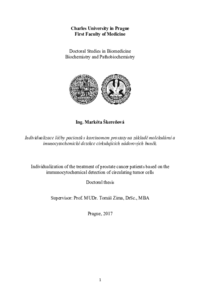Individualization of the treatment of prostate cancer patients based on the immunocytochemical detection of circulating tumor cells
Individualizace léčby pacientů s karcinomem prostaty na základě molekulární a imunocytochemické detekce cirkulujících nádorových buněk
dissertation thesis (DEFENDED)

View/
Permanent link
http://hdl.handle.net/20.500.11956/94231Identifiers
Study Information System: 153747
CU Caralogue: 990021679680106986
Collections
- Kvalifikační práce [4674]
Author
Advisor
Referee
Průša, Richard
Svoboda, Marek
Faculty / Institute
First Faculty of Medicine
Discipline
Biochemistry and Pathobiochemistry
Department
Institute of Medical Biochemistry and Laboratory Diagnostics First Faculty of Medicine Charles University and General University Hospital in Prague
Date of defense
23. 11. 2017
Publisher
Univerzita Karlova, 1. lékařská fakultaLanguage
English
Grade
Pass
Keywords (Czech)
cirkulující nádorové buňky, kastračně rezistentní karcinom prostaty, immunomagnetická detekce, personalizace terapieKeywords (English)
circulating tumor cells, castration-resistant prostate cancer, immunomagnetic detection, personalized therapyÚvod: Se zavedením nových terapeutických možností u kastračně rezistentního karcinomu prostaty (CRPC) vyvstala i potřeba individuální charakterizace onemocnění pro správnou volbu léčby. Jelikož je běžná biopsie u většiny těchto pacientů nevhodná, může být nahrazena tzv. "liquid biopsy", tedy analýzou cirkulujících nádorových buněk (CTC) z krve pacienta. Metody: Metoda AdnaTest (Qiagen, Německo) využívající imunomagnetické obohacení CTC a následnou PCR analýzu vzorků pro přítomnost tumor-asociovaných genů byla testována a použita u 41 pacientů trpících CRPC. Měření bylo provedeno při stanovení diagnózy CRPC a po třetím cyklu terapie docetaxelem. Byl vytvořen a validován panel 27 genů související s volbou terapie u pacientů s CRPC. Genová exprese byla měřena metodou kvantitativní PCR (qPCR) na přístroji BioMark (Fluidigm, USA) a porovnána mezi CTC obohacenými vzorky a bioptickými vzorky primárního nádoru. Výsledky: CTC byly nalezeny u 85% pacientů v době diagnózy a u 45% pacientů v průběhu terapie docetaxelem. Přítomnost CTC a některých tumor-asociovaných genů, tj. EGFR a AR, souvisela s horší odpovědí na léčbu kvantifikovanou pomocí hladiny sérového PSA (sPSA) a sníženým přežitím. Genová exprese mezi vzorky primárního nádoru a CTC obohacenými vzorky se významně lišila. Semikvantitativní detekce PCR...
Introduction: Together with the introduction of new therapeutic options in castration- resistant prostate cancer (CRPC), an advance in individual disease characterization is required. Since common biopsy methods are not suitable for the majority of CRPC patients, one possible solution is the liquid biopsy that is, the analysis of circulating tumor cells (CTCs) isolated from the cancer patients' blood. Methods: A method based on the immunomagnetic enrichment of CTCs and subsequent PCR detection of tumor-associated genes (AdnaTest, Qiagen) was characterized and used for the detection of CTCs in 41 CRPC patients. Each patient was screened at the time of CRPC diagnosis and after the 3rd cycle of docetaxel therapy. A panel of genes associated with therapeutic decision-making was established and validated. Quantitative PCR (qPCR) method on a BioMark platform (Fluidigm, USA) was used to determine the expression of the gene panel in the CTC-enriched and primary tumor samples and the results were analyzed. Results: CTCs were found in 85% and 45% of CRPC patients before and during the therapy, respectively. The presence of CTCs, as well as EGFR and AR PCR fragments, was associated with a decreased sPSA response and lower survival. The gene expression of the CTC- enriched and primary tumor samples differed...
